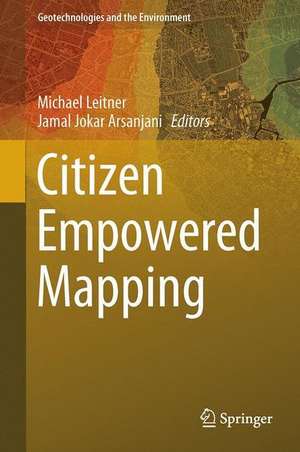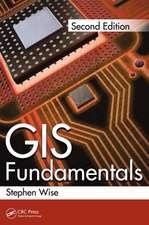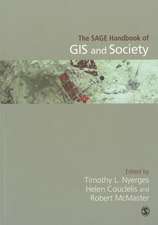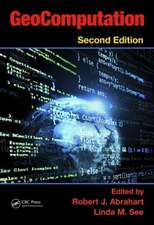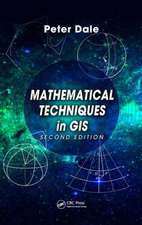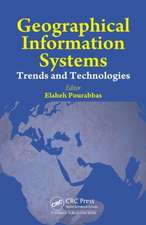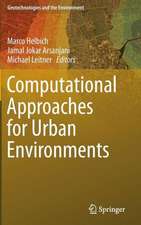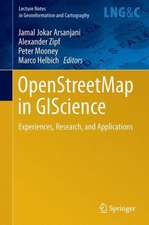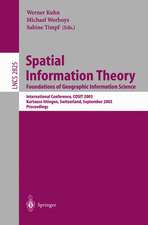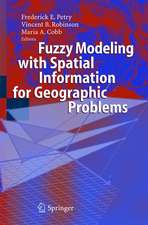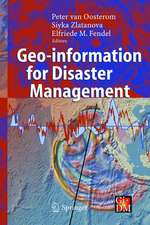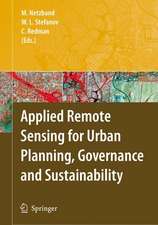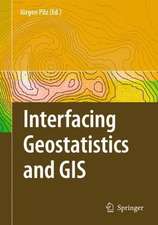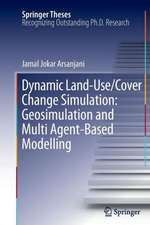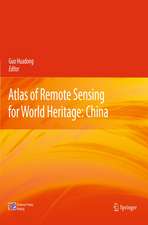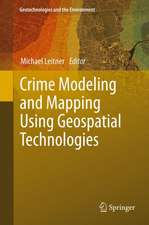Citizen Empowered Mapping: Geotechnologies and the Environment, cartea 18
Editat de Michael Leitner, Jamal Jokar Arsanjanien Limba Engleză Hardback – 8 iun 2017
Topics covered in Citizen Empowered Mapping are of interest for research scholars, practitioners, postgraduates, and professionals from a variety of disciplines including geography, environmental science, geographic information science, social science, and computer science.
| Toate formatele și edițiile | Preț | Express |
|---|---|---|
| Paperback (1) | 608.79 lei 38-44 zile | |
| Springer International Publishing – aug 2018 | 608.79 lei 38-44 zile | |
| Hardback (1) | 1007.49 lei 3-5 săpt. | |
| Springer International Publishing – 8 iun 2017 | 1007.49 lei 3-5 săpt. |
Din seria Geotechnologies and the Environment
- 15%
 Preț: 649.71 lei
Preț: 649.71 lei - 18%
 Preț: 1408.89 lei
Preț: 1408.89 lei - 18%
 Preț: 945.79 lei
Preț: 945.79 lei - 20%
 Preț: 566.51 lei
Preț: 566.51 lei - 18%
 Preț: 952.09 lei
Preț: 952.09 lei - 18%
 Preț: 948.92 lei
Preț: 948.92 lei - 15%
 Preț: 652.31 lei
Preț: 652.31 lei - 18%
 Preț: 951.77 lei
Preț: 951.77 lei - 15%
 Preț: 639.25 lei
Preț: 639.25 lei - 15%
 Preț: 652.17 lei
Preț: 652.17 lei - 24%
 Preț: 746.98 lei
Preț: 746.98 lei - 24%
 Preț: 778.71 lei
Preț: 778.71 lei - 18%
 Preț: 952.72 lei
Preț: 952.72 lei - 18%
 Preț: 968.34 lei
Preț: 968.34 lei - 24%
 Preț: 790.73 lei
Preț: 790.73 lei - 18%
 Preț: 995.63 lei
Preț: 995.63 lei - 18%
 Preț: 886.92 lei
Preț: 886.92 lei - 5%
 Preț: 1106.69 lei
Preț: 1106.69 lei - 18%
 Preț: 1215.04 lei
Preț: 1215.04 lei - 15%
 Preț: 636.12 lei
Preț: 636.12 lei - 18%
 Preț: 967.08 lei
Preț: 967.08 lei - 15%
 Preț: 530.42 lei
Preț: 530.42 lei
Preț: 1007.49 lei
Preț vechi: 1228.65 lei
-18% Nou
Puncte Express: 1511
Preț estimativ în valută:
192.84€ • 209.54$ • 162.09£
192.84€ • 209.54$ • 162.09£
Carte disponibilă
Livrare economică 31 martie-14 aprilie
Preluare comenzi: 021 569.72.76
Specificații
ISBN-13: 9783319516288
ISBN-10: 3319516280
Pagini: 379
Ilustrații: X, 300 p. 106 illus., 71 illus. in color.
Dimensiuni: 155 x 235 mm
Greutate: 0.66 kg
Ediția:1st ed. 2017
Editura: Springer International Publishing
Colecția Springer
Seria Geotechnologies and the Environment
Locul publicării:Cham, Switzerland
ISBN-10: 3319516280
Pagini: 379
Ilustrații: X, 300 p. 106 illus., 71 illus. in color.
Dimensiuni: 155 x 235 mm
Greutate: 0.66 kg
Ediția:1st ed. 2017
Editura: Springer International Publishing
Colecția Springer
Seria Geotechnologies and the Environment
Locul publicării:Cham, Switzerland
Cuprins
Foreword.- introduction.- Part I: Data Acquisition and Modeling.- Chapter 1. Level of Details Harmonization Operations in OpenStreetMap Based Large Scale Maps.- Chapter 2. Cartographic Representation of Soundscape: Proposals and Assessment.- Chapter 3. Evaluating the Current State of Geospatial Software as a Service Platforms: A Comparison Study.- Chapter 4. Big geo-data handling based on parallel and distributed system’s strategies.- Chapter 5. Productive Networks and Indirect Locations.- Part II: Data Quality and Reliability.- Chapter 6.Assessment of Volunteered Geographic Information Data Quality in The National Map Corps Project of the U.S. Geological Survey (USGS).- Chapter 7. On Reliability of Routes Computed Based on Crowdsourced Points of Interest.- Chapter 8. A Comparison of Volunteered Geographic Information (VGI) Collected in Rural Areas to VGI Collected in Urban and Suburban Areas of the United States.- Part III: Environmental Monitoring and Perception.- Chapter 9. Identifying Frostquakes in Central Canada and Neighbouring Regions in the United States with Social Media.- Chapter 10. Structuring Volunteered Geographic Information Collection to Improve Information Processing Efficiency in Environmental Management.- Chapter 11. Volunteered Geographic Information for Building Territorial Governance in Mexico City: The Case of The Roma Neighborhood .- Chapter 12. Crowdsourcing of environmental health quality perceptions: A pilot study of Kroměříž, Czech Republic.
Notă biografică
Jamal Jokar Arsanjani received his doctoral degree in Geographic Information Science (GISc) from the Department of Geography and Regional Research, University of Vienna, Austria. He is currently an Alexander von Humboldt Fellow at the Institute of Geography, Heidelberg University, Germany. His interdisciplinary research interests are in volunteered geographic information and crowdsourcing, geocomputation and spatial planning, remote sensing of the environment, and disaster management. He has published articles in leading international journals of his discipline, including International Journal of Applied Earth Observation and Geoinformation, International Journal of Digital Earth, Transactions in GIS, Cities and single-authored a book on Dynamic Land Use/Cover Change Simulation: Geosimulation and Agent-based Modelling with Springer.
Michael Leitner received a master degree at the Department of Geography and Regional Research, University of Vienna, Austria anda second master and a doctoral degree in GISc at the Department of Geography, State University of New York at Buffalo, US. He is currently a Professor of Geography in the Department of Geography and Anthropology, Louisiana State University, US and a faculty member in the Doctoral College “GIScience” at the University of Salzburg, Austria. He has previously received a Fulbright Scholarship and is the recipient of the 2007 Meredith F. Burrill Award from the Association of American Geographers. His research interests are in GISc and its application to spatial crime analysis, medical geography, and geospatial privacy. He has published two co-authored books, one single-edited book and 40+ refereed articles and book chapters. He is the current editor of Cartography and Geographic Information Science (CaGIS).
Michael Leitner received a master degree at the Department of Geography and Regional Research, University of Vienna, Austria anda second master and a doctoral degree in GISc at the Department of Geography, State University of New York at Buffalo, US. He is currently a Professor of Geography in the Department of Geography and Anthropology, Louisiana State University, US and a faculty member in the Doctoral College “GIScience” at the University of Salzburg, Austria. He has previously received a Fulbright Scholarship and is the recipient of the 2007 Meredith F. Burrill Award from the Association of American Geographers. His research interests are in GISc and its application to spatial crime analysis, medical geography, and geospatial privacy. He has published two co-authored books, one single-edited book and 40+ refereed articles and book chapters. He is the current editor of Cartography and Geographic Information Science (CaGIS).
Textul de pe ultima copertă
This book promotes the exploitation of novel and emerging approaches for mapping environmental and urban informatics empowered by citizens. Chapters are grouped in three sections representing the main subjects. The first section describes data acquisition and modeling. The second section focuses on the quality and reliability of data. The final section presents different methods of environmental monitoring and perception. The book includes diverse case studies from Mexico, the United States and Czech Republic.
Topics covered in Citizen Empowered Mapping are of interest for research scholars, practitioners, postgraduates, and professionals from a variety of disciplines including geography, environmental science, geographic information science, social science, and computer science.
Topics covered in Citizen Empowered Mapping are of interest for research scholars, practitioners, postgraduates, and professionals from a variety of disciplines including geography, environmental science, geographic information science, social science, and computer science.
Caracteristici
Presents innovative approaches to urban informatics Details the benefit of volunteered geographic information Examines crowdsourced data as a valuable source for cartographic representation
